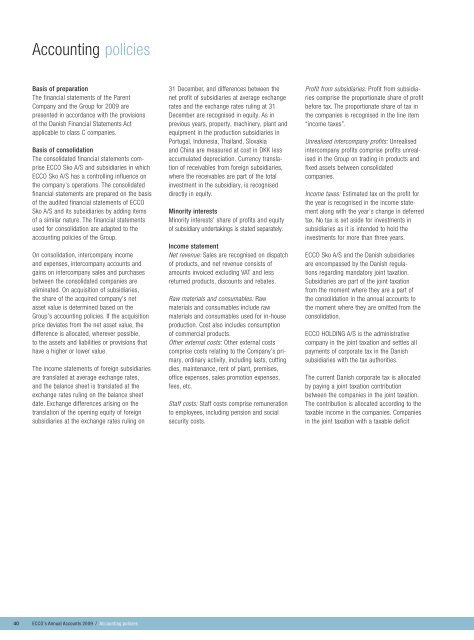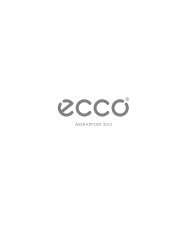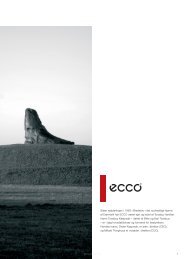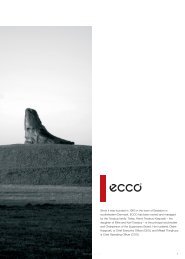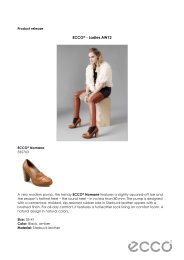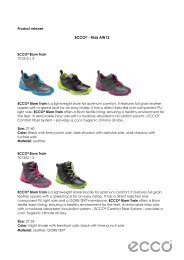Annual Report 2009 - Ecco
Annual Report 2009 - Ecco
Annual Report 2009 - Ecco
You also want an ePaper? Increase the reach of your titles
YUMPU automatically turns print PDFs into web optimized ePapers that Google loves.
40<br />
Accounting policies<br />
Basis of preparation<br />
The financial statements of the Parent<br />
Company and the Group for <strong>2009</strong> are<br />
presented in accordance with the provisions<br />
of the Danish Financial Statements Act<br />
applicable to class C companies.<br />
Basis of consolidation<br />
The consolidated financial statements comprise<br />
ECCO Sko A/S and subsidiaries in which<br />
ECCO Sko A/S has a controlling influence on<br />
the company’s operations. The consolidated<br />
financial statements are prepared on the basis<br />
of the audited financial statements of ECCO<br />
Sko A/S and its subsidiaries by adding items<br />
of a similar nature. The financial statements<br />
used for consolidation are adapted to the<br />
accounting policies of the Group.<br />
On consolidation, intercompany income<br />
and expenses, intercompany accounts and<br />
gains on intercompany sales and purchases<br />
between the consolidated companies are<br />
eliminated. On acquisition of subsidiaries,<br />
the share of the acquired company’s net<br />
asset value is determined based on the<br />
Group’s accounting policies. If the acquisition<br />
price deviates from the net asset value, the<br />
difference is allocated, wherever possible,<br />
to the assets and liabilities or provisions that<br />
have a higher or lower value.<br />
The income statements of foreign subsidiaries<br />
are translated at average exchange rates,<br />
and the balance sheet is translated at the<br />
exchange rates ruling on the balance sheet<br />
date. Exchange differences arising on the<br />
translation of the opening equity of foreign<br />
subsidiaries at the exchange rates ruling on<br />
ECCO’s <strong>Annual</strong> Accounts <strong>2009</strong> / Accounting policies<br />
31 December, and differences between the<br />
net profit of subsidiaries at average exchange<br />
rates and the exchange rates ruling at 31<br />
December are recognised in equity. As in<br />
previous years, property, machinery, plant and<br />
equipment in the production subsidiaries in<br />
Portugal, Indonesia, Thailand, Slovakia<br />
and China are measured at cost in DKK less<br />
accumulated depreciation. Currency translation<br />
of receivables from foreign subsidiaries,<br />
where the receivables are part of the total<br />
investment in the subsidiary, is recognised<br />
directly in equity.<br />
Minority interests<br />
Minority interests’ share of profits and equity<br />
of subsidiary undertakings is stated separately.<br />
Income statement<br />
Net revenue: Sales are recognised on dispatch<br />
of products, and net revenue consists of<br />
amounts invoiced excluding VAT and less<br />
returned products, discounts and rebates.<br />
Raw materials and consumables: Raw<br />
materials and consumables include raw<br />
materials and consumables used for in-house<br />
production. Cost also includes consumption<br />
of commercial products.<br />
Other external costs: Other external costs<br />
comprise costs relating to the Company’s primary,<br />
ordinary activity, including lasts, cutting<br />
dies, maintenance, rent of plant, premises,<br />
office expenses, sales promotion expenses,<br />
fees, etc.<br />
Staff costs: Staff costs comprise remuneration<br />
to employees, including pension and social<br />
security costs.<br />
Profit from subsidiaries: Profit from subsidiaries<br />
comprise the proportionate share of profit<br />
before tax. The proportionate share of tax in<br />
the companies is recognised in the line item<br />
“income taxes”.<br />
Unrealised intercompany profits: Unrealised<br />
intercompany profits comprise profits unrealised<br />
in the Group on trading in products and<br />
fixed assets between consolidated<br />
companies.<br />
Income taxes: Estimated tax on the profit for<br />
the year is recognised in the income statement<br />
along with the year’s change in deferred<br />
tax. No tax is set aside for investments in<br />
subsidiaries as it is intended to hold the<br />
investments for more than three years.<br />
ECCO Sko A/S and the Danish subsidiaries<br />
are encompassed by the Danish regulations<br />
regarding mandatory joint taxation.<br />
Subsidiaries are part of the joint taxation<br />
from the moment where they are a part of<br />
the consolidation in the annual accounts to<br />
the moment where they are omitted from the<br />
consolidation.<br />
ECCO HOLDING A/S is the administrative<br />
company in the joint taxation and settles all<br />
payments of corporate tax in the Danish<br />
subsidiaries with the tax authorities.<br />
The current Danish corporate tax is allocated<br />
by paying a joint taxation contribution<br />
between the companies in the joint taxation.<br />
The contribution is allocated according to the<br />
taxable income in the companies. Companies<br />
in the joint taxation with a taxable deficit


